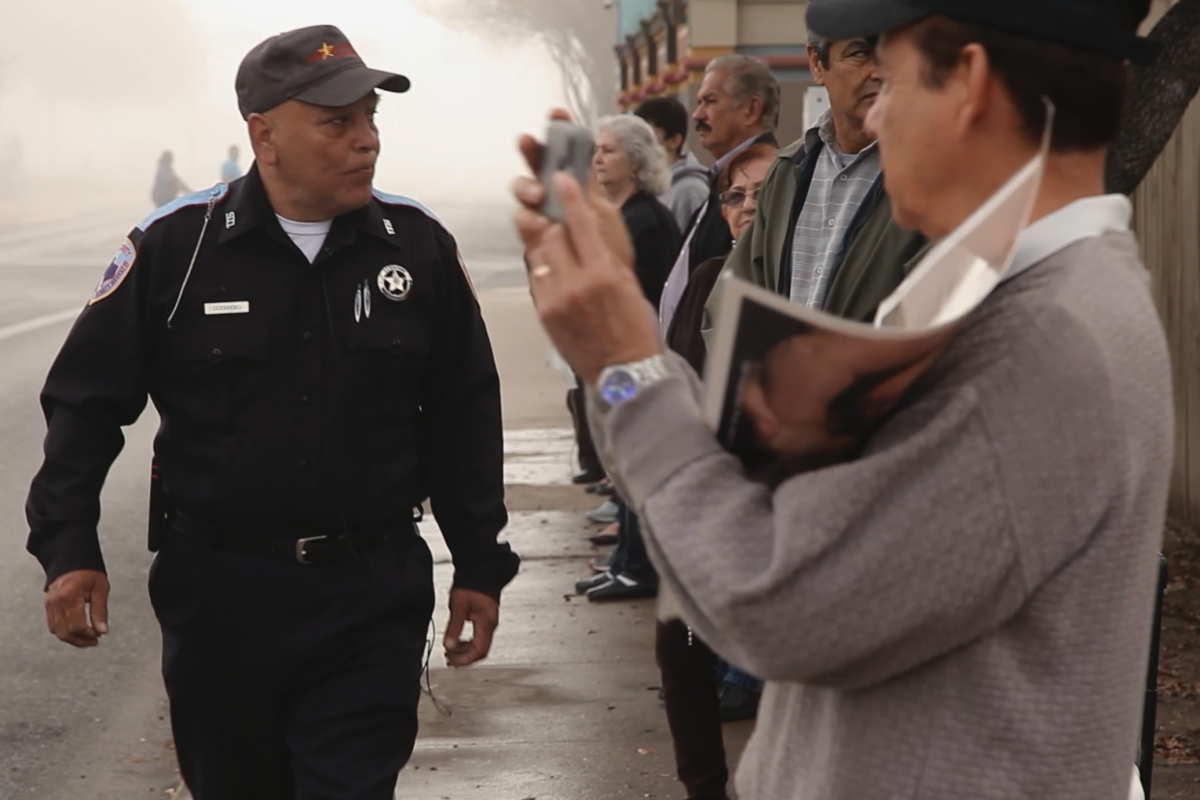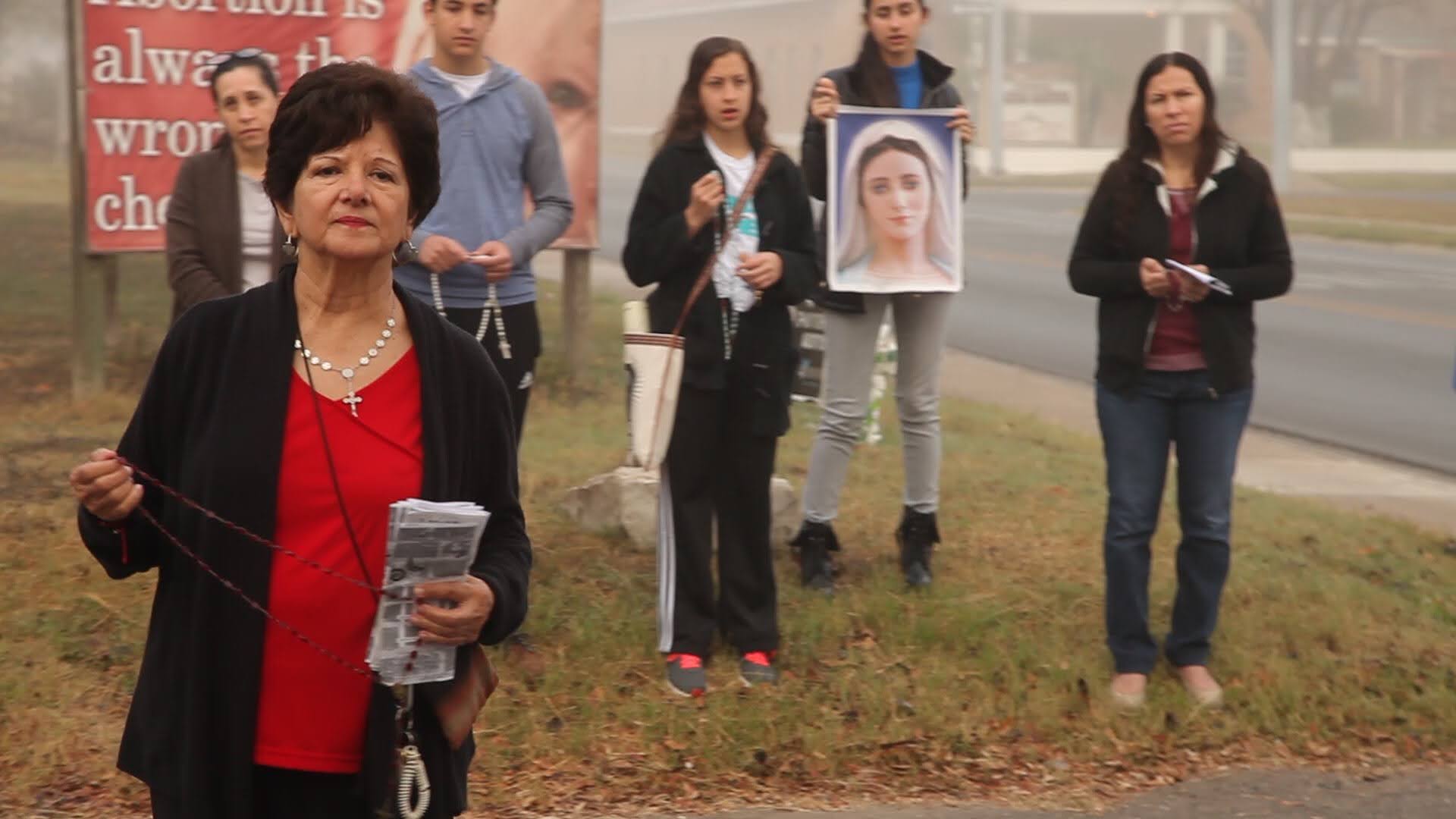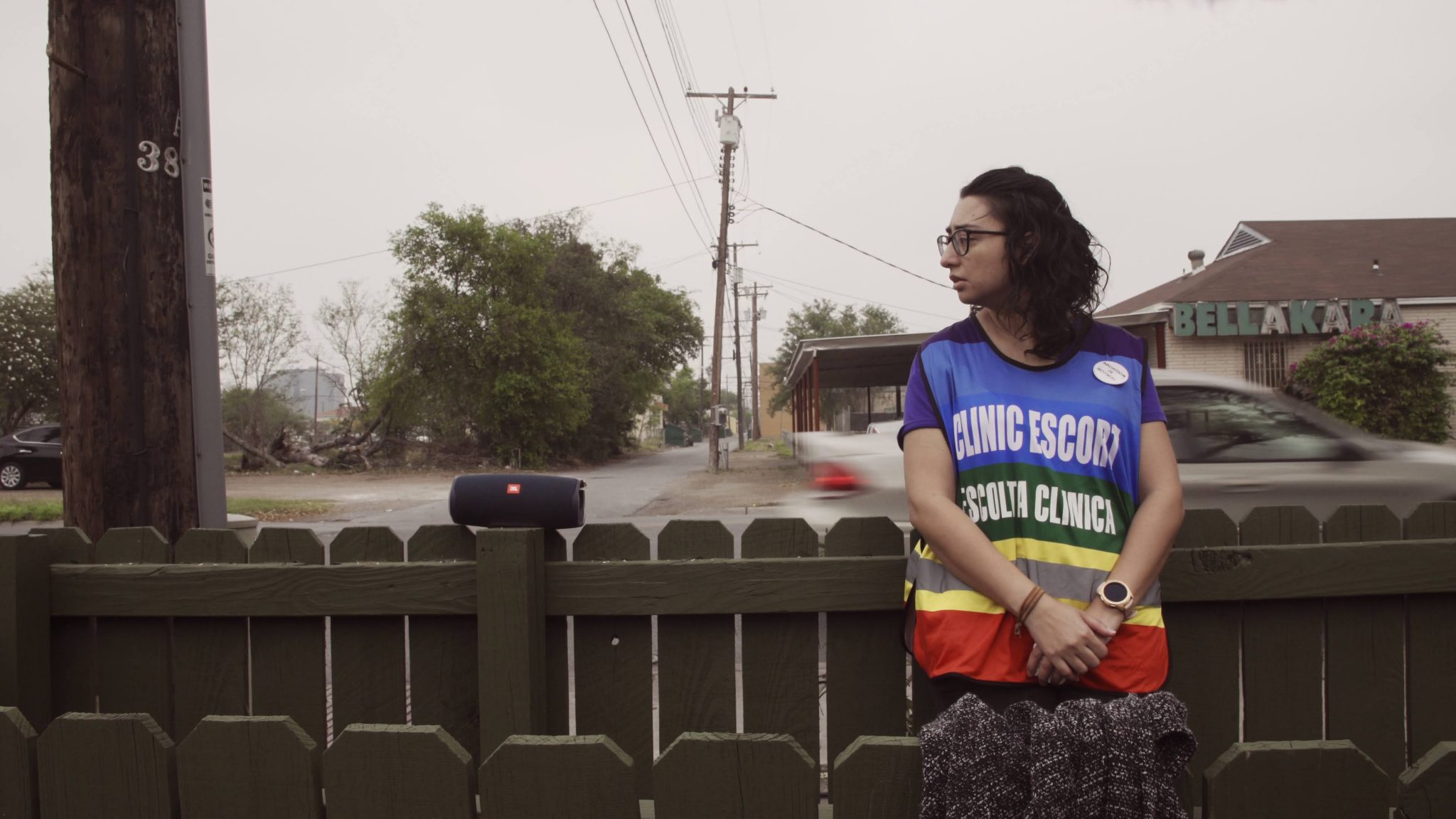

Rey, a Vietnam veteran who works as a security guard at Whole Woman’s Health in McAllen, Texas, the last abortion clinic on the U.S.-Mexico border. He says deeply respects the women whom he protects—even when he’s ostracised by his church and stabbed by men who call him a baby killer. (Courtesy of On the Divide)
When the draft of a Supreme Court opinion overturning Roe v. Wade leaked, documentarians Maya Cueva and Leah Galant were devastated but not surprised. They had spent the last eight years making On the Divide, which tells the story of the last abortion clinic on the U.S.-Mexico border by following three Latinx people with very different relationships to it.
Whole Woman’s Health is in McAllen, Texas, a place Cueva describes as already “post-Roe” even as she reminds folks that “abortion is legal. If you have abortion appointments, still go to them.” She knows that if this clinic closes, the next closest one is over 250 miles away, with checkpoints along the way—which means undocumented people will have to risk deportation to access abortion, or even health care in general.
Galant stresses that allowing states to outlaw abortion will impact “low-income communities of color the most and … McAllen is one of those communities.”


A protest outside Whole Woman’s Health is in McAllen, Texas, the last abortion clinic on the U.S.-Mexico border (Courtesy of On the Divide)
It’s also one of those mythical Latinx birthplaces, akin to East Los Angeles or Miami. Neither Cueva nor Galant come from there but they approached the setting with respect. Cueva recalls starting her interviews with locals by asking, “What are stories that you feel are being left out or ignored?” and going from there.
“There’s a lot of mainstream media reductive narratives around this region, a lot of poverty porn,” she noted. “It is also the epicenter of a lot of, like, failed government systems [including the] over-militarization of the border [and a lack of] funds for reproductive health or health care in general.”
On the Divide tells the story of those failed systems, asking “what does ‘choice’ mean, when you don’t have many options?”
The answer is grim for the film’s three subjects. There’s Denisse, a mother of four, who volunteers as a clinic escort. She’s found a cause and a community there but still struggles with poverty and a government that’s more than happy to leave her behind.


Denisse, mother of four, works as a clinic escort at Whole Woman’s Health is in McAllen, Texas. (Courtesy of On the Divide)
There’s Mercedes, an ex-gang member with substance abuse issues who originally went to the clinic for an abortion before being swayed and then embraced by the protestors outside. Their support doesn’t extend to smiling in church at the vivacious, tattooed woman in their midst though, and it certainly doesn’t help her get contraception when she finds herself with an abusive partner who’s trying to pressure her into getting pregnant.
And there’s Rey, a Vietnam veteran, who gets assigned to the clinic as part of his job as a security guard. When we meet him, he’s gotten over any initial reluctance and deeply respects the women whom he protects—even when he’s ostracised by his church and stabbed by men who call him a baby killer.
Any way you look at it, the “choice” at hand is not much of one, regardless of a person’s religious background. It was important to the filmmakers not to villainize people of faith or play into the false assumption that having a certain religious background automatically determines a person’s views on abortion. Instead, the film shows, and as Cueva says, “It’s possible to maybe be religious and change your views about abortion.”
She recounts a moment at a festival Q&A with film subjects Denisse and Mercedes, where Mercedes apologizes for her Catholic community and some of the things they’ve done while protesting the clinic. For Galant, that’s the whole point: she’s “trying to shift the narrative on abortion,” to show people “they have a place in this debate that feels very dichotomous and polarizing.”
That’s why they’ve partnered with reproductive rights organizations to create discussion guides and host screenings in conservative states, specifically within Christian communities. Cueva is tired of those who would “use religion in a way that can be manipulative”—something On the Divide depicts by filming at a pregnancy crisis center, which she describes as “anti-abortion clinics” without doctors or nurses, a.k.a. “another tactic to control people’s bodies, and to keep them from making the decision they want to make.” Instead, she’s proud to partner with Catholics for Choice who declare that “reproductive justice is a Catholic value.”
As a Latina filmmaker, Cueva also notes that the consequences Black and Brown people face when accessing abortion are higher than those white women typically experience. Those consequences are visible in the film and in places like McAllen, and they may soon be enshrined again as the law of the land.
As Cueva sees it, the stakes couldn’t be higher. “Choice is necessary for survival.”
On the Divide is available to stream for free at pov.org through May 18.
***
A writer and activist, Cristina Escobar is the co-founder of latinamedia.co, uplifting Latina and gender non-conforming Latinx perspectives in media. She’s a member of the Latino Entertainment Journalists Association and writes at the intersection of race, gender, and pop culture. Twitter: @cescobarandrade



[…] We need to unveil the realities of abortion: that women who undergo the procedure aren’t anti-mother, that one’s religious beliefs should not impede another’s rights, that individuals are best at deciding whether they should remain pregnant or not. There are all sorts of tools to help us have these conversations. Check out the National Latina Institute for Reproductive Justice, Catholics for Choice, or even the PBS documentary On the Divide. […]